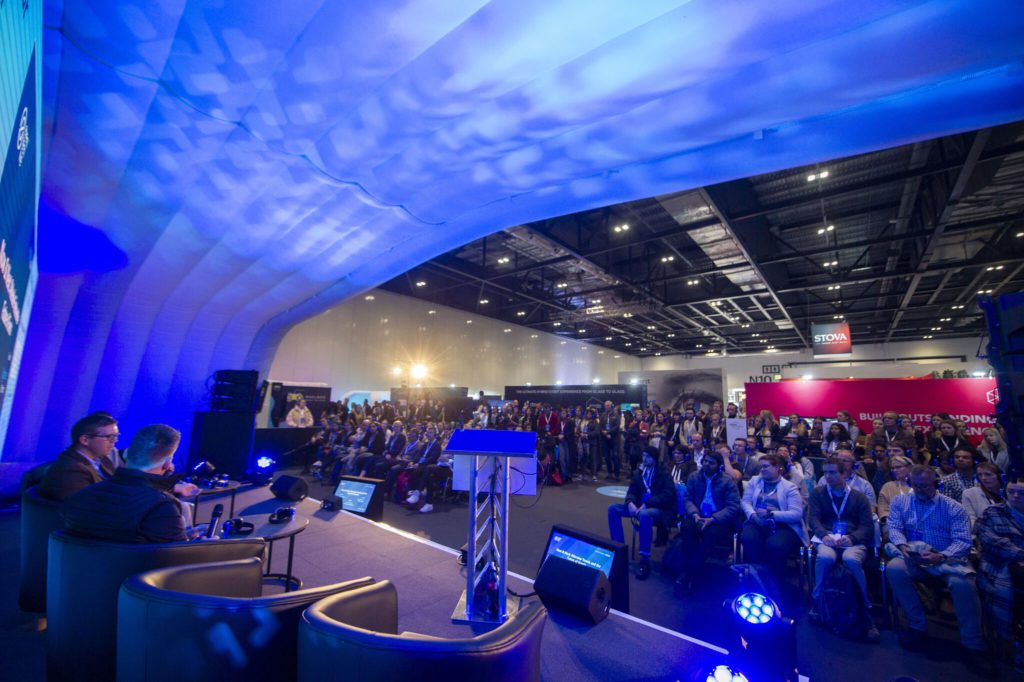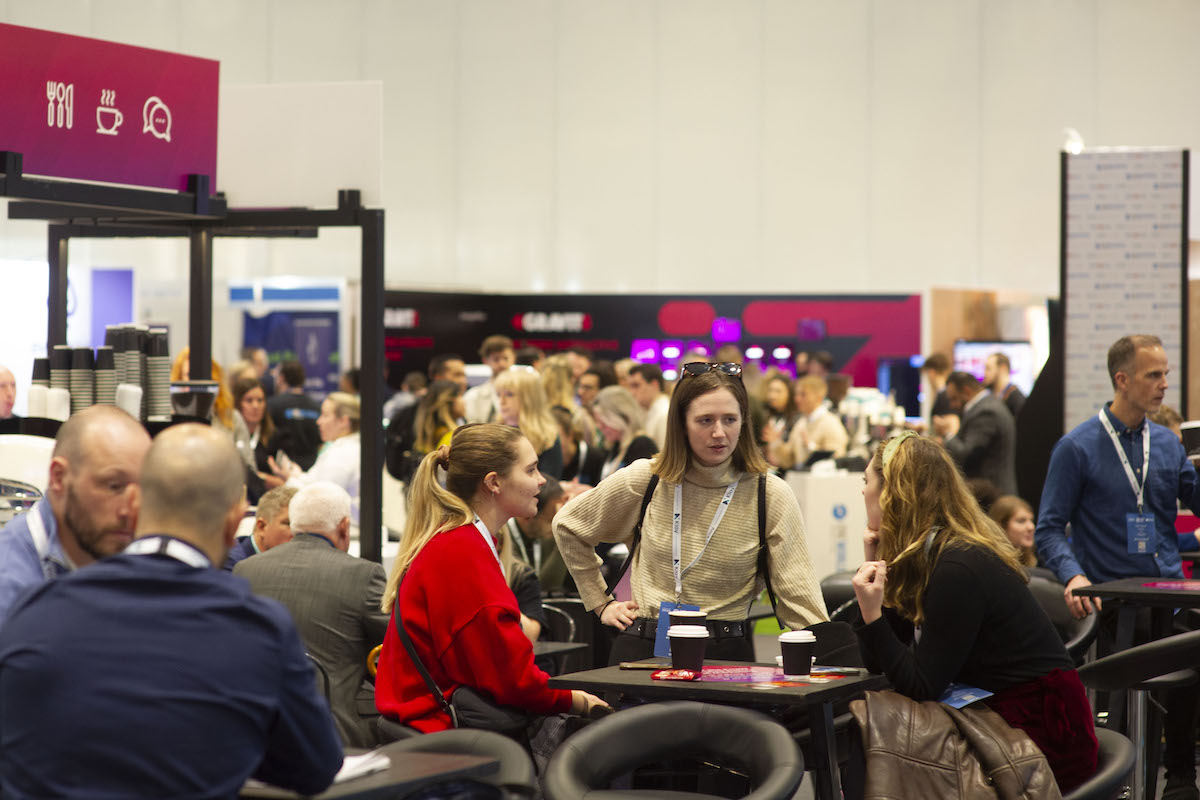Skift Take
Event tech is a sector in flux with an uncertain marketplace. Event Tech Live saw companies of all sizes lay out their sales pitches in hope of finding firm ground for growth.
Event Tech Live 2022, the only trade show dedicated to event tech in Europe, took place last week in London, offering the ideal opportunity to assess the state of the event tech sector.
Organizers shared that over 6,500 people registered for the event, including a virtual-only day on Tuesday. At the end of the first day of in-person gathering, roughly 1,500 had come through the doors.
The show moved from its traditional home at the Truman Brewery in trendy east London, close to Silicon Roundabout and trendy Shoreditch, to the London Excel. With the Elizabeth Line just recently opened and now offering non-stop travel to London Heathrow, the timing for the move could not be better.
Numerous other small shows took place simultaneously at London’s largest convention center, making it feel more like a corporate mall with business events as its flagship stores. Owners ADNEC confirmed the progress on the venue’s expansion just last week.
Event Tech is Alive But Different
The Event tech sector has gone through a crazy ride during the Covid pandemic, with the whole world turning to virtual events as the only way to gather. Event Tech Live 2022 allowed us to understand where we are right now. Gathering together was inspiring, yet there was a feeling of deflation. The interesting thing is that business is actually pretty good. Most companies I spoke to confirmed doubling their revenue compared to 2019. Doubling revenue in the space of three years is, by all measures, an excellent result. But it’s far from the ten times or more we saw at the peak of the virtual event tech bubble.
The teen movie equivalent would feature a group of shy event tech geeks who become incredibly popular for a few years because the popular high schoolers needed something from them — in this case, virtual event technology. Then, gradually, the geeks returned to being unpopular but still far better known than before. Now, the once-popular geeks gathered in London, an eclectic mix of characters who have been on a wild ride but are happy to be back reconnecting with peers.
During this wild ride, event tech came of age. The underlying tech stack and code are now more standardized, companies are more sophisticated in their sales and marketing, and all-in-all, more established. Nevertheless, mergers and acquisitions are still going on behind the scenes, as are layoffs. More of both are still to come as the aftershocks of the Covid pandemic will continue for a while.
Who Was There and Who Was Not
The largest stand belonged to Hubilo, one of the last companies to receive a large round of funding in October 2021. Stova was the headline sponsor and provided the online platform and event app. Other companies with a significant presence included Cvent, RainFocus, Noonah, One World Rental, 4Wall, Yoonity, Bizzabo, Evolution Dome, First Sight Media, Pylon One, Klay Event Technology, EventsAir, Choose 2 Rent, Notified, and Exposure Analytics. Many companies with more extensive stands are supporters or sponsors of the show, so the size of their booths is not necessarily a direct reflection of the investment in the show. Overall, the virtual side of event tech was still in the majority, just as in 2021, but it was pretty evenly balanced.
UK-based Hopin, the event tech company receiving the most investment during the Covid pandemic, was again absent. After making a splash at several industry events in 2021, including a significant presence at IMEX America, they have yet to exhibit or sponsor any events in 2022. Coincidence or not, Hopin announced a new market and product approach the day before the show, which it calls Chapter Two. The company is splitting up its event tech solutions portfolio and moving away from an all-in-one approach. Other notable absences were Webex Events, Community Brands, and EventMobi; all of which were present with booths at IMEX America in October.
Tech and Education Work Well Together
Education has always been a big part of Event Tech Live. For example, content stages took up over 20 percent of the show in large square-shaped sections. In contrast, a more destination-focused show such as IMEX America has less than 5 percent of its floor space dedicated to education. It makes sense to connect education and technology in many ways, as it’s hard to visualize tech concepts or run compelling demos on show floors. Using content and education to explore critical topics is a good approach as long as done tastefully. Thankfully this was primarily the case.

All stages used silent headphone technology to keep the overall volume down and ensure exhibitors could still run business meetings nearby. In addition, all sessions were captured with two cameras and mixed into a standard video format to be released post-show, a nice touch from organizers that also benefit from lots of material for promotional asset creation.
Skift Meetings was part of a session hosted by Chad Blaise, chief revenue officer of Stova, featuring Rhys Morgan, head of digital marketing technology of EMEA, JP Morgan Asset Management, and Miguel Neves, editor-in-chief of Skift Meetings. The session titled “Now & Next: Attendee Trends and the Future of Events” focused on discussing the present and future of event technology. The standing-room-only session attracted over 100 attendees who gained insight into the unique opportunities and challenges that JP Morgan’s events face and insights from Skift Meetings research and reports.
Recurring Conversations
Differing Approaches to Market
How many ways can you approach event tech? Quite a few, it turns out. There is no one model for working with event tech. Even similar-sized companies in the same sector can take completely different approaches that can be led by event planners or differ by department or function. For example, procurement processes can vary greatly; finance teams may lead some, while IT takes charge in other cases. Ultimately, the big question for event tech sales teams is to assess who effectively makes decisions around event technology platform selection. Planners will undoubtedly be part of this process, but their level of influence varies. The level of influence of the target audience is a big question for trade shows in all industries, but this sector seems more in flux than usual.
What drives event tech discovery is another question worth considering and something every major player invests in exploring. There are big questions around the needs; therefore, the discovery process is quite different for in-person events compared to virtual ones. While the platforms are the same, the intent that drives the need may differ.
Maintaining relationships with prospects and clients has never been more critical. Only sales teams with good client relationships can ask crucial questions about future event tech needs. In addition, upcoming changes to how Google manages cookies will impact data collection and are starting to be part of those conversations. Event tech platforms will encourage clients to run more events, with in-person and virtual events a proven way to collect first-party data, thus mitigating the loss of leads that rely on cookie-based marketing.
All In on All-in-One
Most event tech platforms started as registration tools or mobile event apps. Then, through the pandemic, they all added video feeds and built out features around them. Today, the typical approach is to offer an all-in-one platform that can support all sizes and types of in-person, hybrid, and virtual events. If an event tech platform can do most things well, it makes sense to integrate it across a large corporate client’s event portfolio. One core platform saves time and brings plenty of economies of scale. Although some specialist tools may still be required, integrations are always possible.
A desire to offer a comprehensive set of products and services is fueling mergers and acquisitions. For example, Hopin acquired Boomset to add badging capabilities. Bizzabo acquired Kilk to add smart badging and MeetingPlay+Aventri (now Stova) acquired eventcore to boost registration options. This move to complete offerings will likely continue until event tech vendors have either acquired or built their own solutions to common client challenges. Despite current financial challenges, the result is that some of the larger all-in-one platforms may yet acquire platforms that offer proven solutions to specific challenges. Abstract management, badging, navigation, and audience interaction are some solutions that come to mind.
Enterprise Over One-Off Events
The ephemeral nature of events means that event tech mainly services one-off gatherings. While it’s always been clear that being the event tech provider for multiple events is more profitable, the Covid pandemic and subsequent economic uncertainty have made this even more of a priority. Companies are keen to push for subscription pricing and focus on larger clients with a portfolio of events.
In parallel, there is an understanding that clients are looking for something other than event tech platforms as pure software-as-a-service (SaaS). Only the most budget-conscious clients consider using self-service tools to support their events.
Most planners seek real-time proactive support from event tech platforms and varying customization levels. However, for event tech platforms to offer support and customization but keep costs reasonable, they must plan and staff up accordingly. Planners are open to multi-event or even multi-year contracts but are reluctant to over-commit because the scope of their events is in flux, and so is event tech.
Fortunately, most all-in-one platforms have most of the features, which makes it extra hard to differentiate between them, but not all features and tools are created equal, so the devil remains in the detail.
Overall, it is clear that event tech is an industry in flux, still recovering from a boom and bust on the virtual side. The show is not over yet, by any means, but just like with the entire event industry, there is plenty of excitement and uncertainty to go with it.
Correction: A previous version of this story listed ExpoPlatform as absent from Event Tech Live 2022, but they were in fact exhibiting as part of the North America Hub.





